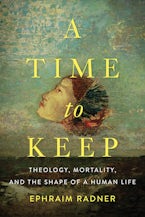Ephraim Radner is one of the most profound and creative theologians of our day. In A Time to Keep he examines some fundamental questions that lie at the root of how we understand ourselves as human beings. Every careful reader will come away from this book with significant new insights as to where the human project sits in the modern age.
~Gary A. Anderson, Hesburgh Professor of Catholic Theology, Notre Dame
A Time to Keep is a dizzyingly learned biblical and natural theology of human existence in which the mystery of humanity reveals the scriptural figure of Christ. We have forgotten that we will die, forgotten that our days are given in, and limited by, a context of divine generosity, generation, and death. In the cacophony of debates over the beginning and end of life, over marriage and sexuality, over the very future of humanity, Radner calls us to the patient discipline of numbering our days.
~Matt Jenson, Associate Professor of Theology, Torrey Honors Institute, Biola University
This book is, among other things, one of the richest and most compelling Christian theologies of human sexuality to appear in decades. It should be ranked alongside works by Karl Barth and St. John Paul II as an indispensable touchstone for ongoing Christian reflection on the meaning of our embodied, procreative, and variously fruitful vocations as creatures of God.
~Wesley Hill, Assistant Professor of Biblical Studies, Trinity School for Ministry
For pointing to the fundamental nature of finitude and creatureliness and for writing in a manner manifesting that very mode of being, we are in Radner’s debt. The book is commended, though the reader must be warned that, as in life, time will be taken to assimilate it.
~Michael Allen, Reading Religion
Radner's prose is thoughtful, and he clearly names the complexities of contemporary life and presents a rich vision of the ways in which Christian wisdom calls humans to lives of meaning and purpose amid finitude.
~Choice
Anything written by Ephraim Radner can be guaranteed to be serious, constructively difficult, spiritually challenging and original, and this book is no exception...This establishes Radner as not only an unusually profound analyst of ecclesial and ecclesiological issues (his previous books have shown that in abundance), not only a theological essayist of near-genius, but a truly systematic theologian in the best sense, someone who can connect the great themes of dogmatic orthodoxy and scriptural figure to the challenges of our culture, which seems increasingly adrift from any idea of what common humanity--let alone common created identity--might amount to.
~Rowan Williams, The Living Church
A formidable book repaid by a second reading
~Jeremy James, Expository Times
Wide and expansive, sure to command the attention of scholars for years, even decades, to come.
~J. Todd Billings, First Things
Radner’s exposition is sprawling. He takes up a wide variety of topics, including family, gender, sex, procreation, suicide, euthanasia, lifespan, wisdom, diversity, singleness, work, and eating.
~Scott Bader-Saye, Interpretation: A Journal of Bible and Theology
Ephraim Radner in A Time to Keep gives us considerable theological guidance for relating to our struggles with mortality, and how those struggles shape and form our lives, to our life as beings created by God. It is a remarkable effort, worthy of Radner’s considerable skills and creative abilities.
~Mark Harris, Anglican Theological Review
A Time to Keep, by Ephraim Radner, is a beautifully written and wide-ranging meditation on human mortality and the God-given form of human life.
~Steven Edward Harris, International Journal of Systematic Theology
A Time to Keep is a well-written, theologically stimulating reflection on human finitude, one that engages a fascinating array of topics, meriting a close read from anyone interested in theological anthropology today.
~Marc Cortez, Scottish Journal of Theology
Some works are genius because they epitomise a genre, others because they push its boundaries. Ephraim Radner’s A Time to Keep: Theology, Mortality, and the Shape of a Human Life exemplifies the latter.
~Amy Erickson, Theology in Scotland

